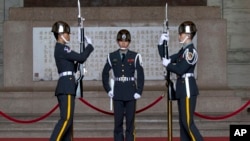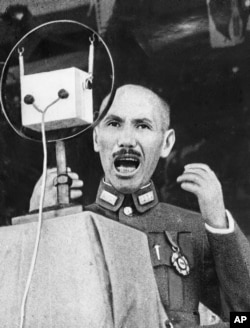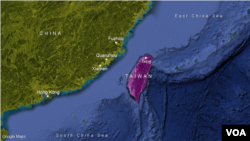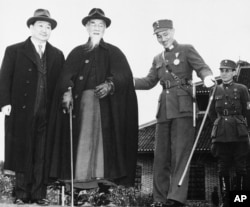Legislation in Taiwan that opens a probe into the heavy-handed rule of former strongman Chiang Kai-shek stands to distance Taiwanese people from their political rival China.
Parliament on Tuesday passed a bill that obligates the government to dig up archives from the era of Chiang’s deadly suppression of dissent after he moved his Nationalist government from China to Taiwan in the 1940s.
The Act on Promoting Transitional Justice calls further for restoring the reputations of those persecuted and advises the removal of tributes to China such as statues and street names, legislators said.
Seeking clarity of the past
Legislators were able to approve the transitional justice act because the ruling Democratic Progressive Party has controlled parliament as well as the presidency since May 2016, the first time ever that the Nationalist didn’t dominate one or both.
Some downplay the Act’s power to let the government diminish Chiang’s image, saying instead it’s meant to restore the reputations of aging Taiwanese who felt persecuted under his rule.
“I think to erase Chiang Kai-shek actually isn’t our key focus,” ruling party lawmaker Lee Chun-yi said. About 100 people want their names cleared, he said. “The most important item is, regardless of political party, for Taiwan to contemplate together and face errors of the past," Lee said. "There’s more value and meaning in that.”
Shift toward ‘localism’
Academics say an investigation that condemns the man whose leadership saw an estimated 28,000 die in a massacre, the start of a wider crackdown on dissent, will swing public opinion on the island toward local rule and away from China.
“It might lead to rise in localism,” said Linda Arrigo, an American-born researcher in Taiwan.
Chiang once ruled all of China before his Nationalists lost the civil war to Mao Zedong’s Communists in the 1940s. He suppressed dissenters in Taiwan in part to root out Communist influence and eventually retake the mainland – which he never did.
Chiang died in 1975 and Taiwan democratized in the late 1980s.
The Nationalists, an opposition party in today's Taiwan, are already trying to emphasize their “Taiwan base” instead of mainland connections, she noted. “If they’re going in that direction, it would seem the direction for them to go,” Arrigo said.
Modern China claims Taiwan as part of its territory. It insists on eventual unification despite opinion polls since 2015 showing that the majority in Taiwan prefers a measure of autonomy. Officials in Beijing have played up ethnic, economic and people-to-people links to bring the two sides closer.
A rebellion in Taipei in 1947 over enforcement of cigarette sales sparked the massacre. In the following decades, a period dubbed the "White Terror," about 140,000 were believed put in prison and others executed.
Risk of forgetting
Taiwan’s cabinet spokesman suggested to the island’s Central News Agency Wednesday that the new law would not require schools and roads to drop references to Chiang from their official names.
But if schools or local governments still remove symbols of the former strongman, younger people might lose a way of remembering his whole past, said Huang Kwei-bo, vice dean of the College of International Affairs at National Chengchi University in Taipei.
“Because Chiang Kai-shek has already become a part of history but younger people especially aren’t clear about the things he did in mainland China, everyone will see him as linked with Taiwan history,” Huang said.
Current Taiwan President Tsai Ing-wen pledged in February to produce a report on the White Terror decades. Names on some related documents are blacked out, Arrigo said.
“In the past they would not let you know who were the oppressors, who was representing the garrison command,” she said.
The Nationalists say they support restoring justice to victims of past wrongs, but says the bill targets only their history, party spokesman Tang Te-ming said. The bill missed a chance to help restore rights of Taiwanese aborigines and women enslaved for sex by the Japanese in World War II, he said.







